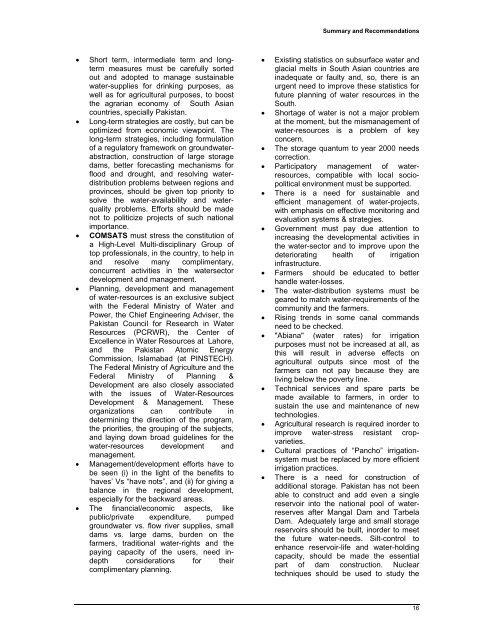Present Scenario and Future Prospects - Science Vision
Present Scenario and Future Prospects - Science Vision
Present Scenario and Future Prospects - Science Vision
Create successful ePaper yourself
Turn your PDF publications into a flip-book with our unique Google optimized e-Paper software.
� Short term, intermediate term <strong>and</strong> longterm<br />
measures must be carefully sorted<br />
out <strong>and</strong> adopted to manage sustainable<br />
water-supplies for drinking purposes, as<br />
well as for agricultural purposes, to boost<br />
the agrarian economy of South Asian<br />
countries, specially Pakistan.<br />
� Long-term strategies are costly, but can be<br />
optimized from economic viewpoint. The<br />
long-term strategies, including formulation<br />
of a regulatory framework on groundwaterabstraction,<br />
construction of large storage<br />
dams, better forecasting mechanisms for<br />
flood <strong>and</strong> drought, <strong>and</strong> resolving waterdistribution<br />
problems between regions <strong>and</strong><br />
provinces, should be given top priority to<br />
solve the water-availability <strong>and</strong> waterquality<br />
problems. Efforts should be made<br />
not to politicize projects of such national<br />
importance.<br />
� COMSATS must stress the constitution of<br />
a High-Level Multi-disciplinary Group of<br />
top professionals, in the country, to help in<br />
<strong>and</strong> resolve many complimentary,<br />
concurrent activities in the watersector<br />
development <strong>and</strong> management.<br />
� Planning, development <strong>and</strong> management<br />
of water-resources is an exclusive subject<br />
with the Federal Ministry of Water <strong>and</strong><br />
Power, the Chief Engineering Adviser, the<br />
Pakistan Council for Research in Water<br />
Resources (PCRWR), the Center of<br />
Excellence in Water Resources at Lahore,<br />
<strong>and</strong> the Pakistan Atomic Energy<br />
Commission, Islamabad (at PINSTECH).<br />
The Federal Ministry of Agriculture <strong>and</strong> the<br />
Federal Ministry of Planning &<br />
Development are also closely associated<br />
with the issues of Water-Resources<br />
Development & Management. These<br />
organizations can contribute in<br />
determining the direction of the program,<br />
the priorities, the grouping of the subjects,<br />
<strong>and</strong> laying down broad guidelines for the<br />
water-resources development <strong>and</strong><br />
management.<br />
� Management/development efforts have to<br />
be seen (i) in the light of the benefits to<br />
‘haves’ Vs “have nots”, <strong>and</strong> (ii) for giving a<br />
balance in the regional development,<br />
especially for the backward areas.<br />
� The financial/economic aspects, like<br />
public/private expenditure, pumped<br />
groundwater vs. flow river supplies, small<br />
dams vs. large dams, burden on the<br />
farmers, traditional water-rights <strong>and</strong> the<br />
paying capacity of the users, need indepth<br />
considerations for their<br />
complimentary planning.<br />
Summary <strong>and</strong> Recommendations<br />
� Existing statistics on subsurface water <strong>and</strong><br />
glacial melts in South Asian countries are<br />
inadequate or faulty <strong>and</strong>, so, there is an<br />
urgent need to improve these statistics for<br />
future planning of water resources in the<br />
South.<br />
� Shortage of water is not a major problem<br />
at the moment, but the mismanagement of<br />
water-resources is a problem of key<br />
concern.<br />
� The storage quantum to year 2000 needs<br />
correction.<br />
� Participatory management of waterresources,<br />
compatible with local sociopolitical<br />
environment must be supported.<br />
� There is a need for sustainable <strong>and</strong><br />
efficient management of water-projects,<br />
with emphasis on effective monitoring <strong>and</strong><br />
evaluation systems & strategies.<br />
� Government must pay due attention to<br />
increasing the developmental activities in<br />
the water-sector <strong>and</strong> to improve upon the<br />
deteriorating health of irrigation<br />
infrastructure.<br />
� Farmers should be educated to better<br />
h<strong>and</strong>le water-losses.<br />
� The water-distribution systems must be<br />
geared to match water-requirements of the<br />
community <strong>and</strong> the farmers.<br />
� Rising trends in some canal comm<strong>and</strong>s<br />
need to be checked.<br />
� "Abiana" (water rates) for irrigation<br />
purposes must not be increased at all, as<br />
this will result in adverse effects on<br />
agricultural outputs since most of the<br />
farmers can not pay because they are<br />
living below the poverty line.<br />
� Technical services <strong>and</strong> spare parts be<br />
made available to farmers, in order to<br />
sustain the use <strong>and</strong> maintenance of new<br />
technologies.<br />
� Agricultural research is required inorder to<br />
improve water-stress resistant cropvarieties.<br />
� Cultural practices of “Pancho” irrigationsystem<br />
must be replaced by more efficient<br />
irrigation practices.<br />
� There is a need for construction of<br />
additional storage. Pakistan has not been<br />
able to construct <strong>and</strong> add even a single<br />
reservoir into the national pool of water-<br />
reserves after Mangal Dam <strong>and</strong> Tarbela<br />
Dam. Adequately large <strong>and</strong> small storage<br />
reservoirs should be built, inorder to meet<br />
the future water-needs. Silt-control to<br />
enhance reservoir-life <strong>and</strong> water-holding<br />
capacity, should be made the essential<br />
part of dam construction. Nuclear<br />
techniques should be used to study the<br />
16


